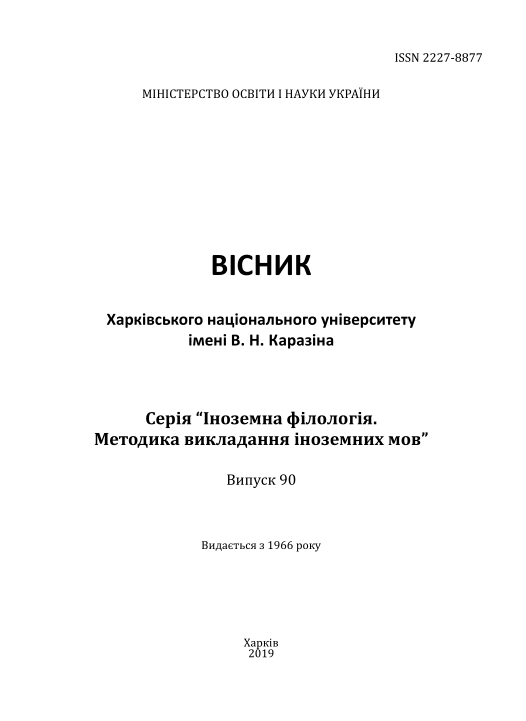Ecologic consciousness in pedagogics
Abstract
The article deals with the problem of eco-pedagogics, in particular, creative activity of the pedagogue in professional sphere. In this connection, the contents of the notions «creativity and «creativeness» in pedagogics are highlighted, their connection with the professional activity of the pedagogue is singled out. The novel of the article is connection of ecological consciousness of the pedagogue with usage of creative means of education, such as means of creative stylistics, didactic games. New original views are explicated in the methodology of subject-language education CLIL (Content and Language Integrated Learning) as a creative method of pedagogical activity which has intersubject character and is used in teaching subjects in a foreign language. The concept of creativity and creative work as basic ecological methods of pedagogics is studied in close connection with creative facilities and methodologies, that are actively used in modern Higher School. In the study, creativity is understood as a result of creative activity of the teacher. The basic competences of a creative pedagogue which are as follows (according to V.V. Pavlenko): force, flexibility, endurance and co-ordination of mind, which contact with permanent creative process, are examined. The importance of creative facilities of language game, that are powerful devices of consciousness development and self-development of a student, is underlined. In the article, the functions of deductive game are determined as ecological pedagogical means of activation of studying process (the function of forming of interest in studies, new mental formations, educational activity itself, skills of educational and independent work, skills of self-control and self-appraisal, adequate mutual relations and adoption of social roles), and also basic principles of CLIL methodology are distinguished. This methodology is based on fundamental concepts: content, communication, cognition, culture.
Downloads
References
Antonova O. Ye. Pedagogichna kreativnist u strukturi pedagogichnoyi obdarovanosti vchitelya [Pedagogical creativity in the structure of the pedagogical talent of a teacher] // Novi tehnologiyi navchannya: Nauk.-metod. zb.: u 2 ch / Ministerstvl osviti i nauki Ukrayini, Institut innovacijnih tehnologij i zmistu osviti. K. : Vinnicya, 2011. Vip. 69, ch. 2. 12 s.
Bogolyubov S.A. Ekologicheskoe pravo: Uchebnik dlya vuzov. [Environmental Law: Textbook for universities] M.: Izdatelstvo Norma, 2001. 448 s.
Goncharenko S.U. Ukrainskyi pedagogichnyi slovnyk [Ukrainian Pedagogical Dictionary.] - Kyiv: Lybid,. 1997. 326 c.
Dzyatkovskaya E.N. Ekologizaciya kak vzaimodejstvie predmetnogo i aspektnogo soderzhaniya obrazovaniya [Ecologization as interaction of subject and aspect content of education] // Pedagogika. 2013. № 4. S. 24-33.
Doronina M.V. O sistemnosti ekologicheskogo soznaniya v sovremennoj nauke i kulture: Na materiale agroekologicheskih nauk [On the systematic nature of environmental consciousness in modern science and culture: On the material of agroecological sciences] : avtoref.dis... kand. filosof. nauk: 09.00.01. Tyumen, 2005. 26 s.
Ivanova E.V. Lingvokognitivnoe modelirovanie ekologicheskogo diskursa : monografiya [Linguocognitive modeling of environmental discourse: monograph]. M. : FLINTA : Nauka, 2015. 176 s.
Pavlenko V.V. Kreativnist uchitelya yak chinnik rozvytku pedagogichnoyi tvorchosti [Creativity of a teacher as an official in development of pedagogical creativity]. Formuvannya dydaktychnoyi kompetentnosti pedagogiv doshkilnoyi ta pochatkovoyi osvity: zbirnyk naukovo-metodychnyh prats / za zag. red. V.Ye. Lytnova, N.Ye. Kolesnyk, T.V. Naumchuk. Zhitomyr : Vyd-vo ZhDU im. I.Franka, 2015. 648 s.
Pahomov Yu.N. Formirovanie ekocheloveka: Metodologicheskie principy i programmnye ustanovki [The formation of the eco-man: Methodological principles and purposes]. SPb: SPbGU, 2002. 124 s.
Samohina V.O., Dmytrenko Yu.O. Pedagogichna gumorologiya [Pedagogical Humorology] // Metodychni ta psyhologichno-pedagogichni problemy vykladannya inozemnukh mov na suchasnomu etapi: shlyahy integratsii shkoly ta VNZ / Materialy XI Mizhnaronoi naukovo-metodychnoii konfereneci. Kharkiv, 18 kvitnya, 2019. S. 134-135.
Ekologizaciya obshestvennogo soznaniya [Ecologization of public consciousness] / Access: http://isgod.ru/posts.php?id=4 (Access date:15.09.2019)
Nikolina Tsvetkova. Developing Intercultural Communicative Competence through CLIL (Content and Language Integrated Learning)// BETA-IATEFL, 2013. S. 141-156.




